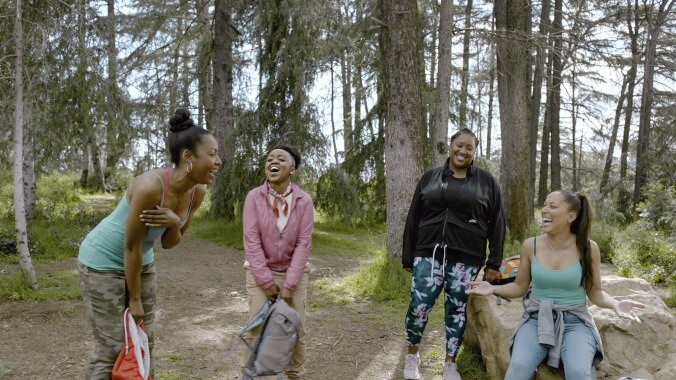A Black Lady Sketch Show offers unfettered access to four dynamic comic minds


In the “content” era, TV comedy increasingly feels like a way for networks to populate their YouTube channels and inevitably create some sort of podcast presence. Sketches are created to be shared without any larger context; scenes from sitcoms get turned into short videos to be shared. Late-night talk shows are competing to create viral moments that can become their own webseries. Narrative becomes irrelevant; there are only clicks. A Black Lady Sketch Show possesses a confidence in its first season that suggests the show is not interested in being chopped up into easily consumable chunks. A Black Lady Sketch Show seems more interested in creating a whimsical, loving world for its leads. The new sketch series offers up unfettered access to the minds of four dynamic women: Ashley Nicole Black, Quinta Brunson, Gabrielle Dennis, and the show’s creator, Robin Thede.
Shows like Chappelle’s Show and Key & Peele transitioned between sketches by having their respective hosts speak directly to the audience. On ABLSS, Black, Brunson, Dennis, and Thede sit around Thede’s fictional apartment, play UNO and dominos, drink wine, and have the personal conversations women have in private when drink is flowing. The chemistry and ease between the performers playing perfectly styled versions of themselves would be enough to sustain an entire series. The conversations effortlessly drift from UNO house rules to protecting your edges to the racist origins of common phrases. It’s clear from the jump that ABLSS isn’t interested in drawing lines around what Blackness is or isn’t—it’s interested in presenting as many different depictions of Black womanhood as possible.
In a world where series like Saturday Night Live have struggled to find and showcase one Black woman, having four Black women share a television show feels like overabundance. The show delights in joyful moments of recognition between Black women, like realizing you got play cousins in common or that the other Black ladies at work got your back. ABLSS puts these moments of recognition in high-stakes situations, creating sketch premises that feel both familiar and outlandish.
Each of the four leads has made a name for themselves elsewhere, but getting to know them in the sketches and interstitial conversations is like getting four new girlfriends. Robin Thede is probably most well-known for being the first African American woman to be the head writer for a late-night talk show (The Nightly Show With Larry Wilmore) and she hosted her own talk show on BET. On ABLSS, Thede balances a flirtatious presence with a regal, authoritative air. She sizzles as a Betty Boop-esque vintage groupie in episode four and a reoccurring conspiratorial Afro-centric guru. Thede plays Jackée Harry in a 227 parody in episode three, and it feels like Thede has been waiting for the right time to deploy her impression.
Quinta Brunson, a.k.a. the “Oh, you got money?” gif, is known for her work in BuzzFeed’s early videos and her own internet shorts. Her strength is her playful and naughty energy. Her unique dancing carries more than one sketch, and she’s just as comfortable as the manifestation of a woman’s insecurity as she is an old lady at a church breakfast. Gabrielle Dennis previously appeared in Marvel’s Luke Cage as the principled Tilda; she taps into the same intensity, but on a self-aware series, Dennis’ forcefulness allows her to be a deft foil for the more ridiculous elements. In the moments where the show ventures into horror, Dennis can be downright terrifying, bringing with her an elegance and darkness that’s surprising in sketch comedy.
Ashley Nicole Black is formerly a writer and correspondent for Full Frontal With Samantha Bee, and recently went Twitter Moment viral for employing Elizabeth Warren as a matchmaker. A recurring sketch about Black being the ultimate spy because she’s unnoticeable is laughable only because of her commanding presence. She plays outraged as powerfully as she does optimism or narcissism, and her transformations in each scene are masterful. She forces the audience to look her in the eye and recognize her star power.
It’s not a surprise that ABLSS explores where womanhood and gender intersect with the Black experience, but the way it explores these topics and the conclusions it draws are novel. It’s striking how many sketches center around the admission that being beautiful is a frustratingly difficult pursuit and how averageness begets invisibility. The “Bad Bitch Support Group” teased in commercials is about the pressure to constantly wear #501 lashes. In a fantastic cameo, Bob The Drag Queen is the MC of “The Basic Ball,” a loving homage to the ballroom scene where the queens are serving their best “Running Errands” looks. Most sketch shows would revel in how ugly they can make their leads, but the show would rather highlight how we overlook those who don’t meet beauty standards. Those moments of ugliness are balanced by moments of extreme glam and beauty. (The hair and wig work in this series is impeccable.) In the interstitial conversations, Black wears a neon green jumpsuit that’s to die for, and Dennis looks amazing in a sequin wrap top. Even as the women and their opinions get messier, they stay looking incredible.
It would be easy to sum up the appeal and impact of A Black Lady Sketch Show with a whole mess of clichés. There will inevitably be headlines that play off “Black Girl Magic” and “Black (INSERT NOUN HERE) Matters” but A Black Lady Sketch Show’s political impact is allowing for a unique and compelling set of Black women to center their voices and create a fun and sprawling universe to hang out in.